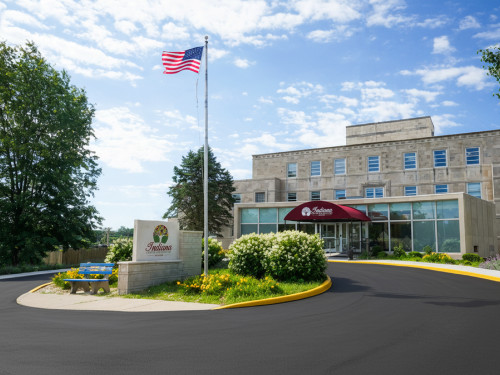
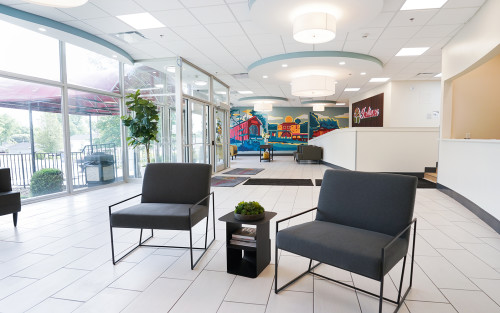

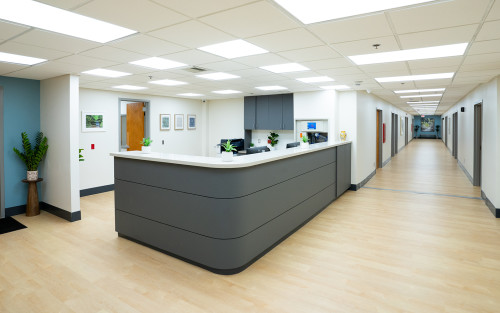
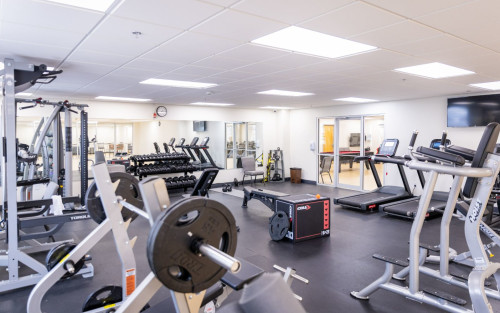




Indiana Center for Recovery Bedford
Verified Center
This provider's information has been quality-checked by Recovery.com's Research Team for accuracy and completeness, including center verification through appropriate third-party organizations.
Treatment Focus
This center treats substance use disorders and mental health conditions. You'll receive individualized care catered to your unique situation and diagnosis, learn practical skills for recovery, and make new connections in a restorative environment.
Primary Level of Care
Offering intensive care with 24/7 monitoring, residential treatment is typically 30 days and can cover multiple levels of care. Length can range from 14 to 90 days typically.
Treatment Focus
This center treats substance use disorders and mental health conditions. You'll receive individualized care catered to your unique situation and diagnosis, learn practical skills for recovery, and make new connections in a restorative environment.
Primary Level of Care
Offering intensive care with 24/7 monitoring, residential treatment is typically 30 days and can cover multiple levels of care. Length can range from 14 to 90 days typically.
Provider's Policy
The insurances listed represent the current in-network partners for this location. While not shown here, Newport also accepts many out-of-network plans and are happy to work with you to explore coverage options.
Indiana Center for Recovery Bedford
Indiana Center for Recovery Bedford
About Indiana Center for Recovery Bedford
Named one of America’s Best Treatment Centers for 4 consecutive years (2021–2024), Indiana Center for Recovery in Bedford delivers compassionate, innovative outpatient care. Their day treatment bridges the gap between residential and traditional outpatient treatment by offering structured, evidence-based therapies while allowing clients to return home each evening. Upon arrival, clients are warmly welcomed with a facility tour, check-in by a behavioral health technician, and introductions to their care team. Treatment begins with a personalized plan that tackles the root causes of addiction through individual counseling, group therapy, and skill-building workshops.
Flexible Treatment with Holistic Support
The center offers tailored care to meet each client’s unique needs. Their dual-diagnosis program addresses both substance use and mental health conditions, while stand-alone services focus on either addiction or mental health. Comprehensive options include evidence-based therapies, Medication-Assisted Treatment (MAT), and medication management. Day treatment typically lasts 2-3 weeks. This holistic approach treats substance use and co-occurring challenges such as anxiety, depression, and PTSD, ensuring a dual-diagnosis focus that promotes both mental and physical recovery.
Recovery That Includes Your Family
Family involvement is a cornerstone of the program, with therapy sessions and resources designed to empower loved ones to actively support the recovery process. These services strengthen communication and relationships, fostering a supportive environment for lasting success.
Veteran-Centric Care
Veterans receive specialized care tailored to their unique needs, including GeneSight genetic testing to optimize medication effectiveness and minimize side effects. Combined with personalized counseling, therapy, and skill-building workshops, this evidence-based approach ensures lasting recovery and improved mental health.

Highlights from the Center
Highlights
These highlights are provided by and paid for by the center.
Customized Treatment Plans
Holistic Approach
Licensed for Both Addiction & Mental Health
All Services On-Site
Center Overview
Treatment Focus
This center treats substance use disorders and mental health conditions. You'll receive individualized care catered to your unique situation and diagnosis, learn practical skills for recovery, and make new connections in a restorative environment.
Joint Commission Accredited
The Joint Commission accreditation is a voluntary, objective process that evaluates and accredits healthcare organizations (like treatment centers) based on performance standards designed to improve quality and safety for patients. To be accredited means the treatment center has been found to meet the Commission's standards for quality and safety in patient care.

Indiana Center for Recovery Bedford
Insurance Accepted
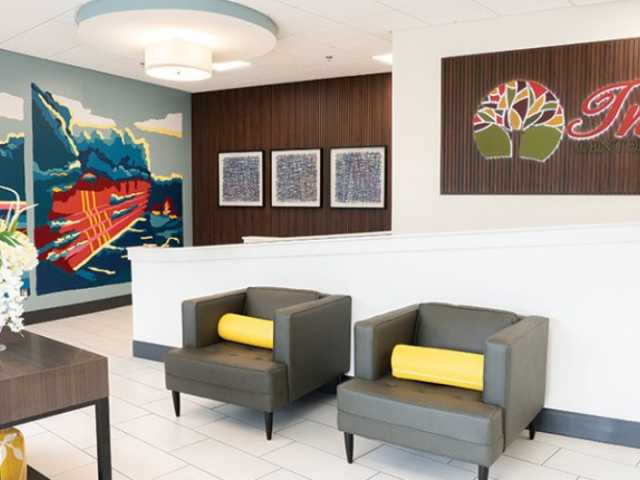



Recovery.com Verified Listing
Recovery.com verified that the name, location, contact information and license to operate for this treatment provider are valid and up-to-date.

Joint Commission Accredited

Licensed by Indiana
Recovery.com is an independent, third-party mental health resource. Verification does not imply endorsement and does not guarantee the quality of treatment services.
Meet Your Care Team
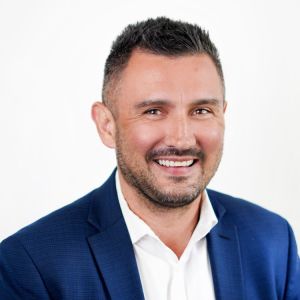
Cheyenne Riker
Executive Director

Dr. Michael Kane
Chief Medical Officer
MD
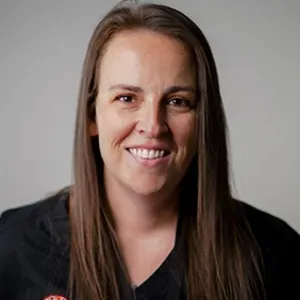
April Dralle
Director of Nursing
FNP-C, PMHNP
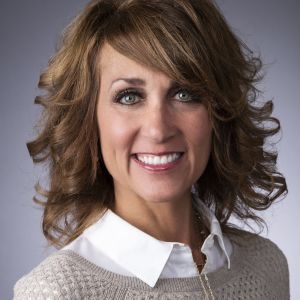
Tami Blevins
Director of Operations

Sean Scroggins
Administrative Clinical Director
LMHCA
Your Care Options
Specializations
Meditation & Mindfulness
A practiced state of mind that brings patients to the present. It allows them to become fully aware of themselves, their feelings, and the present moment.
Alcohol
Using alcohol as a coping mechanism, or drinking excessively throughout the week, signals an alcohol use disorder.
Detox
Detox fully and safely removes toxic substances from the body, allowing the next steps in treatment to begin with a clean slate.
Co-Occurring Disorders
A person with multiple mental health diagnoses, such as addiction and depression, has co-occurring disorders also called dual diagnosis.
Drug Addiction
Drug addiction is the excessive and repetitive use of substances, despite harmful consequences to a person's life, health, and relationships.
Family Involvement
Providers involve family in the treatment of their loved one through family therapy, visits, or both–because addiction is a family disease.
Medication-Assisted Treatment
Combined with behavioral therapy, prescribed medications can enhance treatment by relieving withdrawal symptoms and focus patients on their recovery.
Veterans
Patients who completed active military duty receive specialized treatment focused on trauma, grief, loss, and finding a new work-life balance.
Who We Treat
Men and Women
Men and women attend treatment for addiction in a co-ed setting, going to therapy groups together to share experiences, struggles, and successes.
Veterans
Patients who completed active military duty receive specialized treatment focused on trauma, grief, loss, and finding a new work-life balance.
Treatment Services
Detox
Detox fully and safely removes toxic substances from the body, allowing the next steps in treatment to begin with a clean slate.
Licensed Primary Mental Health
Some primary care providers offer mental health diagnosis and treatment. This can prevent patients from developing more serious conditions.
Outpatient
During outpatient rehab, patients attend a structured treatment program while continuing to live at home.
Residential
In a residential rehab program, patients live onsite, with access to daily treatment and 24-hour care. An average stay is 30-90 days.
Approaches
Evidence-Based
A combination of scientifically rooted therapies and treatments make up evidence-based care, defined by their measured and proven results.
Individual Treatment
Individual care meets the needs of each patient, using personalized treatment to provide them the most relevant care and greatest chance of success.
Twelve Step
Incorporating spirituality, community, and responsibility, 12-Step philosophies prioritize the guidance of a Higher Power and a continuation of 12-Step practices.
Therapies
1-on-1 Counseling
Patient and therapist meet 1-on-1 to work through difficult emotions and behavioral challenges in a personal, private setting.
Meditation & Mindfulness
A practiced state of mind that brings patients to the present. It allows them to become fully aware of themselves, their feelings, and the present moment.
Art Therapy
Visual art invites patients to examine the emotions within their work, focusing on the process of creativity and its gentle therapeutic power.
Family Therapy
Family therapy addresses group dynamics within a family system, with a focus on improving communication and interrupting unhealthy relationship patterns.
Medication-Assisted Treatment
Combined with behavioral therapy, prescribed medications can enhance treatment by relieving withdrawal symptoms and focus patients on their recovery.
Motivational Interviewing
Based on the idea that motivation to change comes from within, providers use a conversational framework to discover personalized methods for change.
Music Therapy
Singing, performing, and even listening to music can be therapeutic. Music therapy sessions are facilitated by certified counselors.
Twelve Step Facilitation
12-Step groups offer a framework for addiction recovery. Members commit to a higher power, recognize their issues, and support each other in the healing process.
Substances We Treat
Alcohol
Using alcohol as a coping mechanism, or drinking excessively throughout the week, signals an alcohol use disorder.
Benzodiazepines
Benzodiazepines are prescribed to treat anxiety and sleep issues. They are highly habit forming, and their abuse can cause mood changes and poor judgement.
Co-Occurring Disorders
A person with multiple mental health diagnoses, such as addiction and depression, has co-occurring disorders also called dual diagnosis.
Cocaine
Cocaine is a stimulant with euphoric effects. Agitation, muscle ticks, psychosis, and heart issues are common symptoms of cocaine abuse.
Drug Addiction
Drug addiction is the excessive and repetitive use of substances, despite harmful consequences to a person's life, health, and relationships.
Ecstasy
Ecstasy is a stimulant that causes intense euphoria and heightened awareness. Abuse of this drug can trigger depression, insomnia, and memory problems.
Heroin
Heroin is a highly addictive and illegal opioid. It can cause insomnia, collapsed veins, heart issues, and additional mental health issues.
Psychedelics
Hallucinogenic drugs—like LSD—cause euphoria and increased sensory experiences. When abused, they can lead to depression and psychosis.
Languages
Aftercare
Care Designed for Your Needs
Personal Amenities
Amenities
Activities
Yoga
Yoga is both a physical and spiritual practice. It includes a flow of movement, breathing techniques, and meditation.

Learn More About the Center
Medical Detox to Manage Withdrawal and Begin Healing
Begin recovery safely with medical detox and whole-person support during withdrawal.
24/7 Residential Addiction and Mental Health Treatment
Get round-the-clock care and a supportive community to jumpstart recovery.
Flexible Outpatient Treatment for Addiction and Mental Health
Balance life and recovery with outpatient programs tailored to individual schedules and needs.
Personal Addiction Treatment for Veterans
Receive care built for veterans: respectful, trauma-informed, and tailored to their experiences.
What people are saying
Treatment
4.8
Accommodations
4.8
Food & Nutrition
4.7
Value
4.8
Michelle
Reviewed 06/25/25
Review from Rehabs.com
Misti
Reviewed 06/25/25
Review from Rehabs.com
Courtney
Reviewed 06/24/25
Review from Rehabs.com
Melissa
Reviewed 06/25/25
Review from Rehabs.com
J
Reviewed 06/25/25
Review from Rehabs.com





